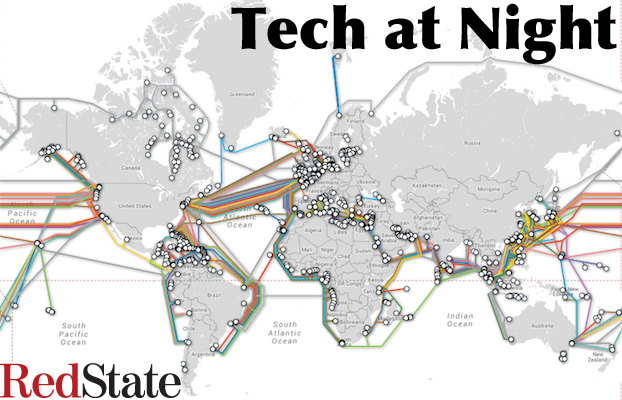
All too often it’s the case that government acts, and forces corporations to behave in a certain way, but then we go and blame the corporations instead of the government that’s making them do it.
Naturally the folks inside the beltway reacted this way tonight during the World Series game. Blame anyone but government.
Continue reading »

I like to point out how the Net Neutrality / Title II Reclassification gang makes inconsistent arguments, for example complaining about ‘fast lanes’ even as it pushes for Title II which would allow ‘fast lanes’.
Well, it turns out if you scratch beneath that inconsistent surface, you get the real motivation: “to hobble corporations”. They think that’s the job of the FCC.
Continue reading »

Sometimes the government cheers the idea that your data is being protected from the bad guys. Other times, the government grumbles and complains.
It turns out they’re fine with your data being at risk, as long as it means government can get to it whenever it wants. Funny, that.
Continue reading »

Delay, obfuscate, distract. The anarchists are doing everything they can to try to keep Silk Road drug ring founder Ross Ulbricht from facing justice. His lawyers want his trial delayed and are slinging mud about FBI, and his fellow anarchists are attempting to intimidate the judge.
America used to bar anarchists from entering the country. These days it’s easy to see why that was wise.
Continue reading »

A service called Snapchat has been around a while, purporting to let its users share images, without the recipient being able to save them. Except well, it never was possible to prevent that, and that’s been known all along. Snapchat’s answers was to try to warn the sender if the photo was saved but… they weren’t that great at that.
So now a bunch of nude Snapchat photos may come out but, seriously, if you were sending nude photos around in this way, you didn’t really care about your privacy anyway.
Continue reading »

According to the government, if they think you’re breaking the law, they have the authority to break into your servers. Given the possibility of errors, combined with the tendency of third parties to gather data which could help, this puts private citizens online in a tricky spot.
Now, don’t get me wrong, I’m not sympathetic to the Silk Road scum, and I’m inclined to look the other way when an anarchist gets stomped by the state.
However, Google is right that it’s government’s fault that there’s a new push for encryption online.
Even if you support NSA’s role online, a government that is not transparent while actively searching people’s data, is a good reason to keep your data encrypted. Governments make mistakes, and data gets leaked. Just look at Bradley Manning’s case, or Edward Snowden’s.
Should our data be at the mercy of anarchists, traitors, and opportunists? No, we have the right to secure our data. And government has no business telling us they need special access. Democrats have wanted that since the Clinton era, with the Clipper program of so-called Escrowed Encryption (where you can encrypt your data, but government can always decrypt it), but it’s never had any popular support. Rightfully not.
If Belkin can’t even keep routers running, why would anyone trust the Internet of Things?
There’s no such thing as a ‘light’ or ‘forbearance’ version of Title II Reclassification, which would cause the Internet to be regulated by the FCC like the phone system. 1930s regulation for 2010s technology.
Net Neutrality violations are a myth, finds the European Commission, after spending a year trying to gin up justification for government control of the Internet.

Have to say, sometimes enforcement of things is rather inconsistent in this country.
If you or I (or Aaron Swartz) were caught making unauthorized access to other people’s computer equipment, to engage in a Denial of Service attack, we’d risk criminal charges. Marriott International? Not so much.
Continue reading »

The fact that the Net Neutrality and “Title II Reclassification” debates are being driven by myths and falsehoods seems to be getting out.
Which is why we now see them getting more desperate.
Continue reading »